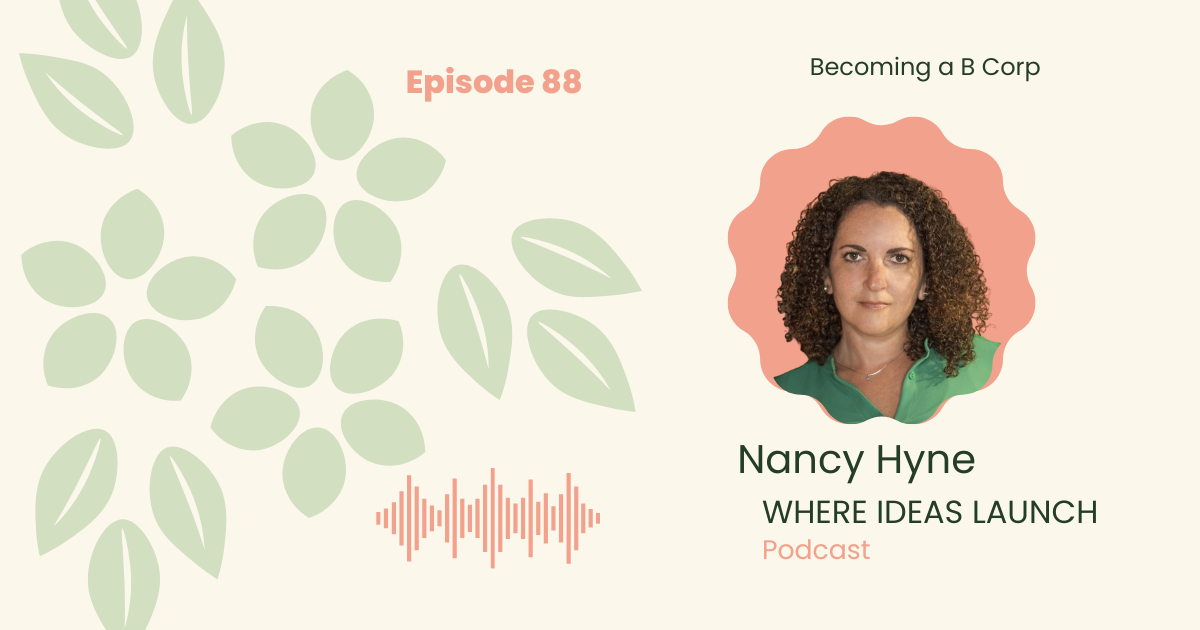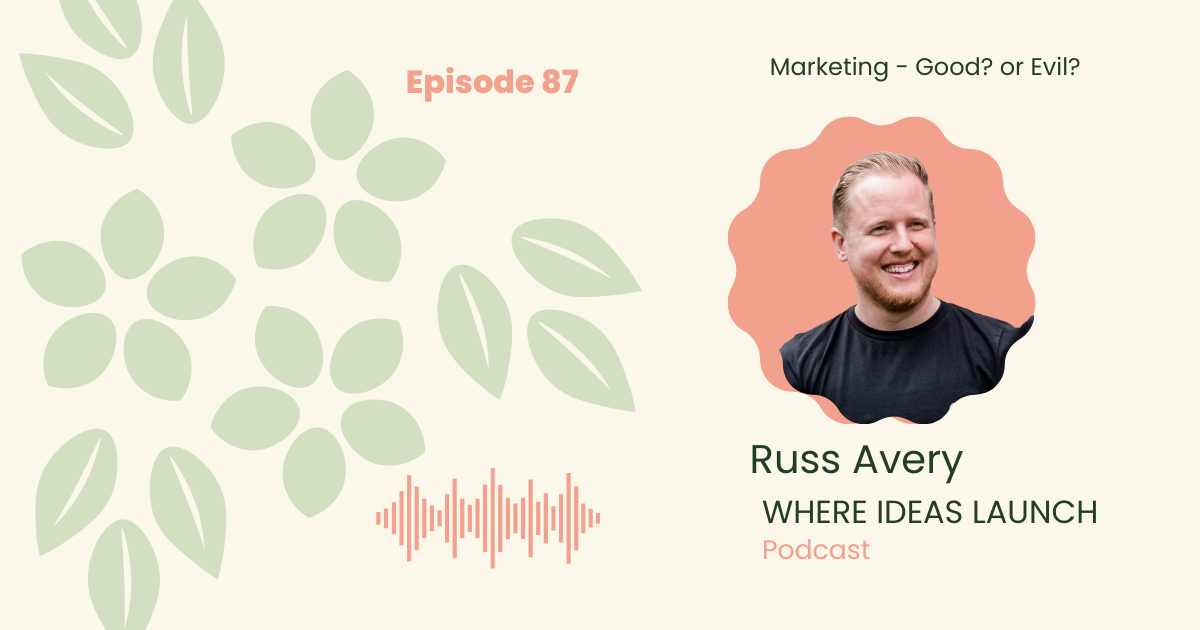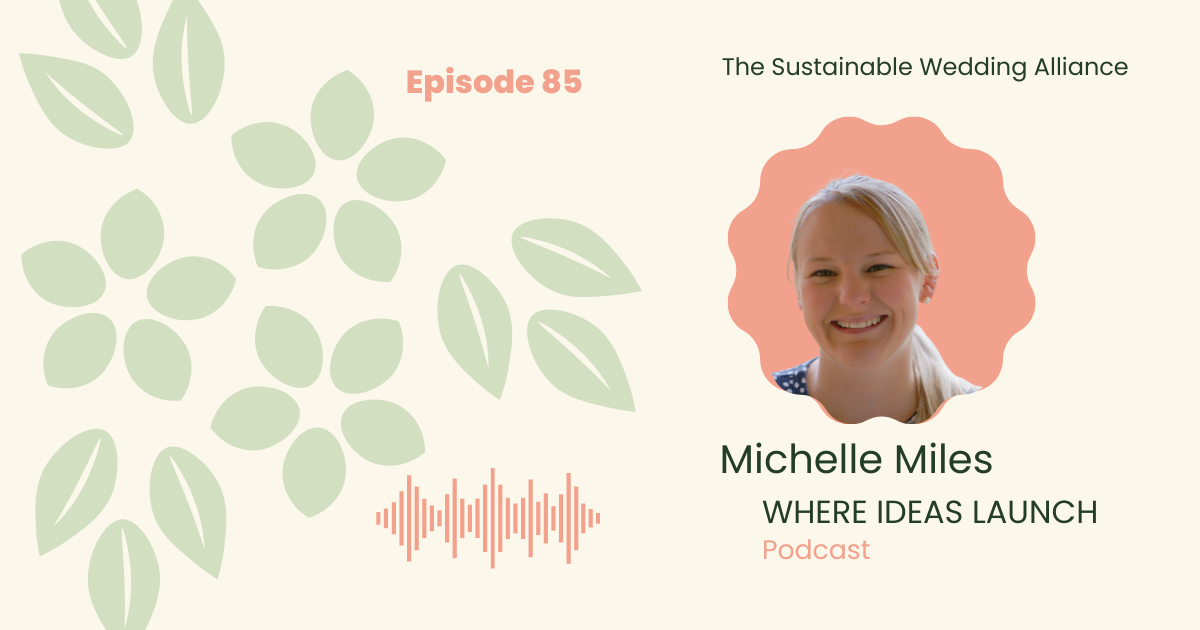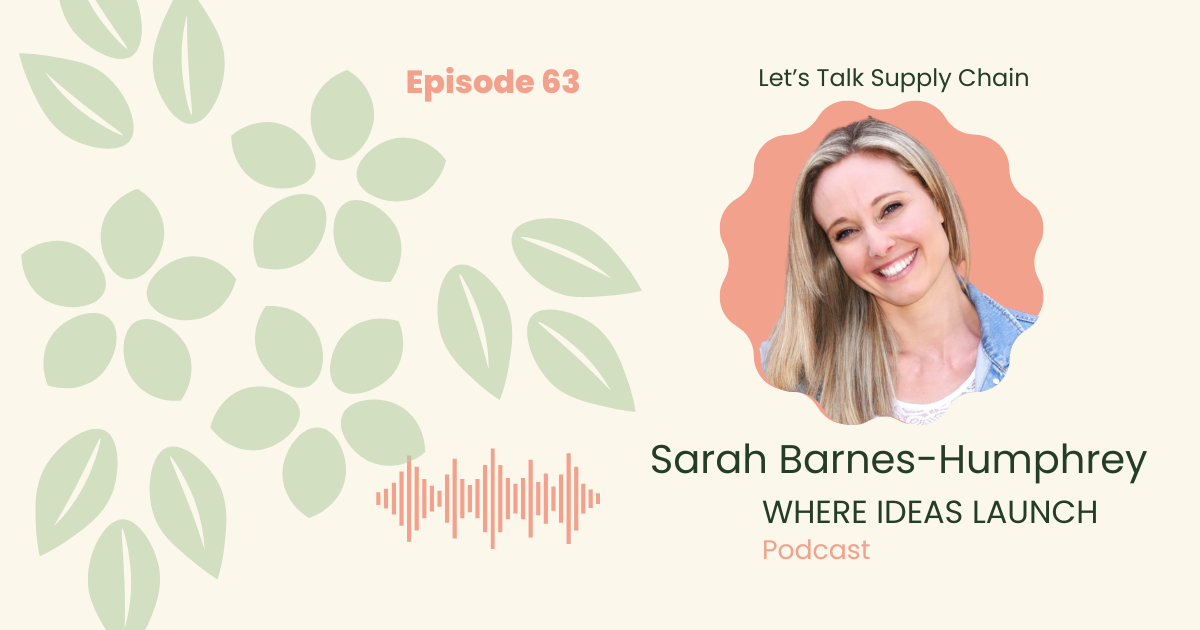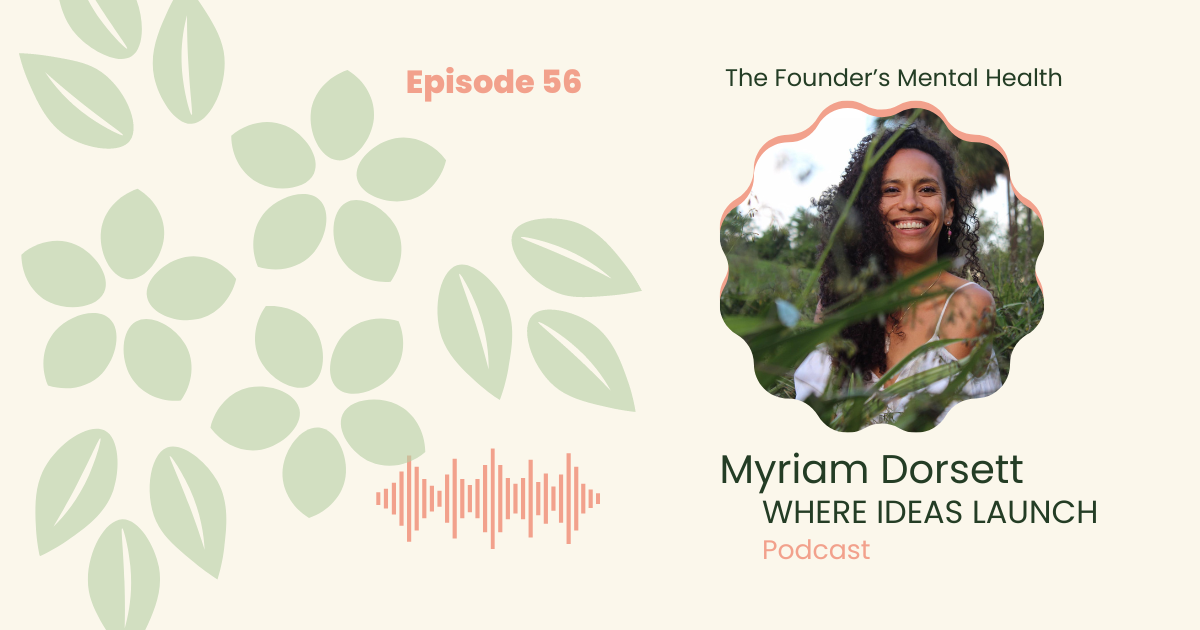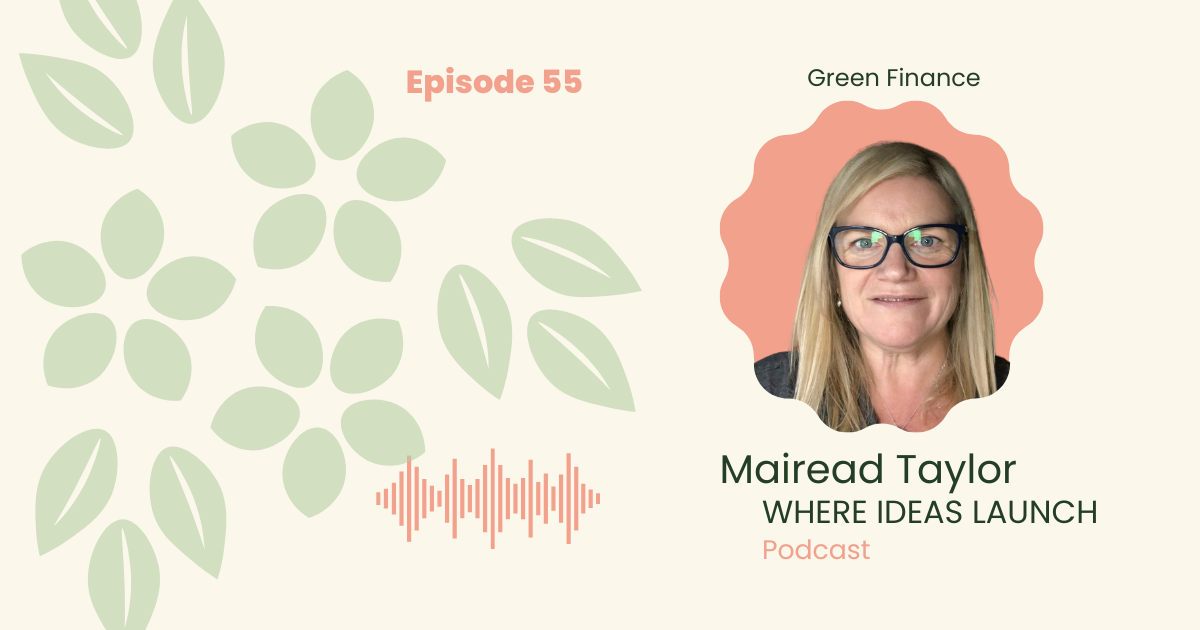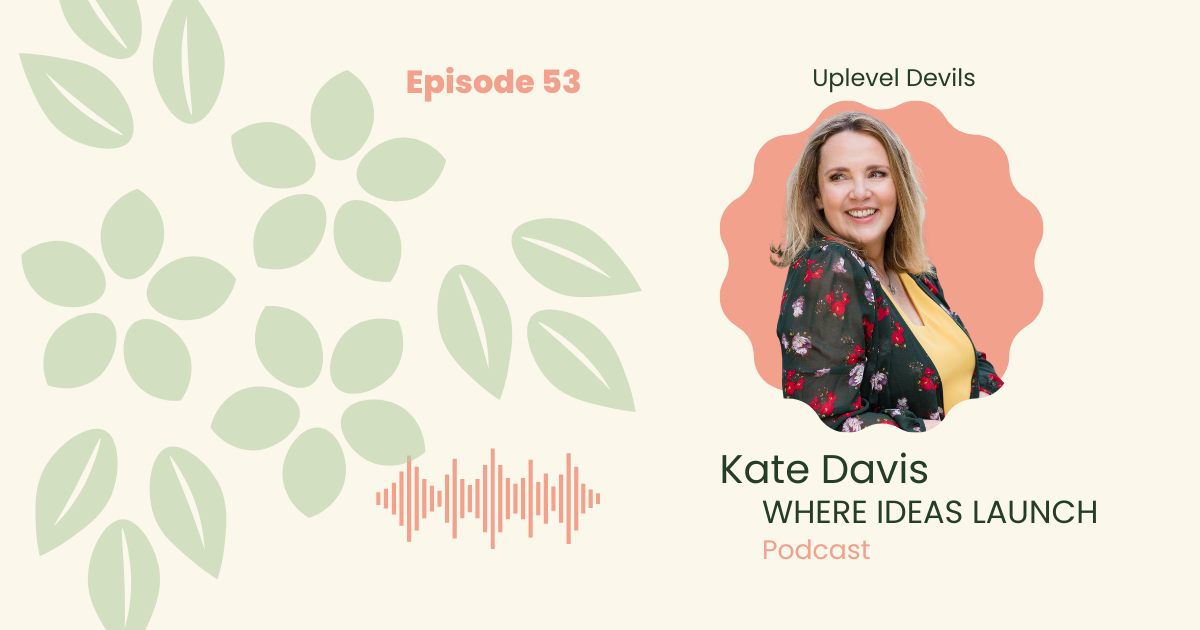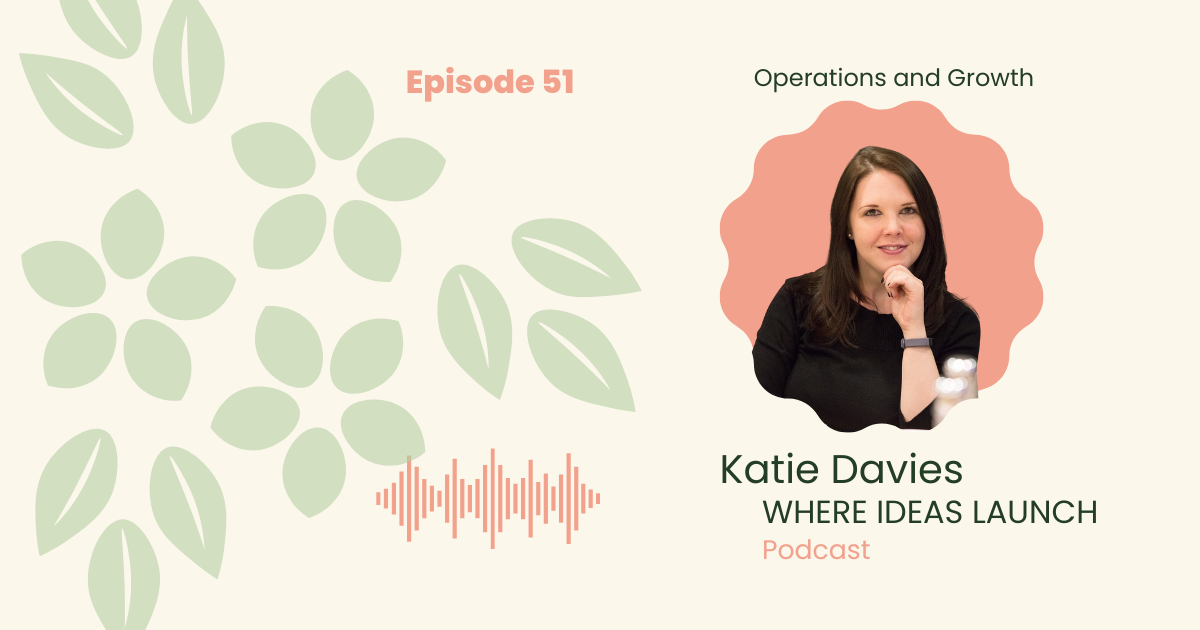092 The Little Green Duck on Strategy

About this Episode
Katie Skelton, founder of Little Green Duck, is a business consultant and strategist who helps impact-led entrepreneurs to untangle their ideas, manage projects and maximise their impact.
Katie works on a personalised basis, and will always get to the heart of the areas of support that her clients need, before suggesting a solution.
She loves to discover innovative, forward-thinking businesses and connect with new people so please go and find her via the links in the show notes now.
Subscribe to Where Ideas Launch
Connect with Katie
Episode Transcript
Katherine Ann Byam 0:00
So Jeff Bezos just announced that he's giving his fortune to charity. And somehow it did not have the same effect, as Patagonia announcing that they're setting up this Charitable Fund.
Katie Skelton 0:12
I kind of feel like that's the same as McDonald's announcing that they're giving all their profits to a vegan charity that doesn't balance each other out. Just because you're doing good in one place doesn't mean that that just eliminates all of the bad you have ever done. No, it's a totally different message, isn't it? And I think that that's where being very careful around the marketing that you're putting out there. And being very careful about not greenwashing is difficult, fine, you've got to change the underlying problem, because you're right. Patagonia was a fantastic example of a company that was already doing good, doing even more good. And I know, we all have to start somewhere. But I feel like Jeff Bezos probably could have started somewhere else.
Katherine Ann Byam 1:01
This is Season Five, the great debates of our times, Season Five will be centred around the great debates. And we will be comparing and contrasting different viewpoints on various topics that are consuming the public discourse at present. The reason I've decided to take this approach is because, we or at least many of us, are losing the skill of debate. And I think this is an essential skill for us all to practice once more. I don't see how we get to the point of saving the world and saving our planet, if we don't know how to discuss our differences. I also think that the solution to most of our challenges is somewhere in the spectrum of views but never at either extreme. I will be working with guests to curate the content and discuss beforehand, I will understand their positions, their areas of genius, and navigate my questions around that so that the conversation is challenging and stimulating without being combative. I hope you enjoy Season Five of Where Ideas launch; The Sustainable Innovation Podcast. Katie Skelton, founder of Little Green Duck is a business consultant and strategist who helps impact lead entrepreneurs to untangle their ideas, manage projects and maximise their impact. Katie works on a personalised basis and will always get to the heart of the area of support that our clients need, before suggesting a solution. She loves to discover innovative, forward thinking businesses and connect with new people. So please go and find her via the links that I will share with you in the show. Katie, welcome to Where Ideas Launch. It's such a pleasure to host you on the programme.
Katie Skelton 2:38
Thank you so much for having me, it feels like it's been a long time coming.
Katherine Ann Byam 2:41
I know right, it's a pleasure to finally speak to you, one to one. And I know that we were on this panel together about a year ago, with four other people. And since then you've invited me for networking a few times, but I haven't actually made it. I think I wanted to be able to say that. That's why I didn't make it to the last one. But this is our first real conversation. So I'm really pleased to get stuck in and get into this.
Katie Skelton 3:05
Yeah, I'm really excited too.
Katherine Ann Byam 3:06
I had a noodle through your LinkedIn and your job history and saw that your background is deeply linked to account management, business development. And I was wondering a little bit about what these historic experiences have given you to help shape who you are today?
Katie Skelton 3:21
Yeah, sure I was this has only really come to me recently, quite recently. That the background that I have in sales and account management, it's all been about connecting people and making connections between people who might not necessarily connect with each other. So back in my days as a commercial manager in the broadcast industry, I used to be the, like the bridge between the technical and engineering teams and the client who were not necessarily technically minded, and try to translate those ideas from something that was very heavily, heavily technical, sometimes quite difficult to understand into something that you could sell is something that I've only just realised is a skill and something that I really love doing that I've brought into my my business now.
Katherine Ann Byam 4:13
Yeah, that's, that's really an important skill, particularly as we get into the eco space and eco businesses, because I think this is one of the areas that we more struggle with, because there's such a commercial focus to business development, fundamentally. And where the change and transition that we're going through in terms of eco businesses at the moment, there's less of a commercial focus and more of an impact focus and being able to combine those two things is a little bit tricky. So I think that your, your insight is really spot on and important for eco businesses. So let's talk a little bit about the Little Green Duck and how did this brand and the movement behind it come about?
Katie Skelton 4:54
Okay, so the name itself was actually just thought of by my two and a half year daughter at the time, I couldn't think of a business name, I actually used to write a blog that was all about vegan food, it was completely, and parenting, so it was completely different completely separate from what I'm doing now. And I said to my daughter, I'm starting up a what it was, at the time a copywriting business, she didn't know what that was, but I said, what should I call it? And she just said, Little Green Duck. And I said, Okay, and so it stuck. And now it's really nice, because she can actually read the words on the screen when she can see that I'm working on my business. So that's how the name came about. And then the actual, the ethos behind it. So as I said, I started as a copywriting business. And I started writing for broadcast companies, because that was my history. And then in 2019, we took our two children travelling around the world for nine months, so we sold everything we had, sold our house and took our children travelling. And halfway around that trip, actually, it was probably a bit longer in into the trip, I was sitting with some friends in New Zealand on New Year's Eve 2019 into 2020. So just before the world went crazy, and there was smoke coming out, we were on the coast, and there was smoke coming from the wildfires in Australia, and just making everything really eary, and really orange. And that was the point when I thought I've always cared about looking after our planet and doing whatever I can to protect the environment that we have for our children. But I don't think it really hit home to me that I could embed that in my business at that stage, and also how much I cared. And I just thought at that moment, when I saw that smoke, and I've got photos of my children kind of within that smoke on like little canoes in the water, I thought, I've got to focus on making some kind of impact with my business, I can't just kind of carry on going blindly, and just trying to make money and doing whatever I can, I've got to have some kind of passion behind it. So that was the moment when I decided I was going to work with businesses with some kind of impact at their heart.
Katherine Ann Byam 6:55
I totally get that. And it's funny because I think I'm going to say something that's probably not based on any fact, just on my feeling. I think New Zealand is a key transition place for many people. I was there in 2019, as well, I'd already known that I wanted to start a business with sustainable ethos. But when I got to New Zealand, and I saw all the geography and geology of that country, how well preserved it is, how they care for it. And I thought to myself, my goodness, like this could be anywhere, this and this could be everywhere, you know, and as I started to explore the whole thing about regenerative agriculture, you know, that's a big movement in New Zealand as well. And I started to realise, oh, my goodness, like there's so much more we can do. And when you see a pristine place, like an almost untouched, place. So you kind of get an appreciation for what we spoiled. And what we can do like how we can actually play a part in making this whole thing better. So like the fact that you tell the New Zealand Story, it's just it just hits me right right in my heart, because it really, that was an experience that really shifted things for me as well. So thank you fo sharing that.
Katie Skelton 8:05
It's a totally, totally magical place. And I completely agree. And the stark contrast, I live in the New Forest. And so again, absolutely beautiful area butt the difference in the level of respect people have for the place compared with somewhere like New Zealand is really, really obvious. You can drive along the roads in the New Forest and see McDonald's wrappers all over the place. And people have chucked stuff out their windows, and it just makes me really cross. But I think also part of that, that journey for me was sitting there and thinking, I'm contributing to this by taking my children travelling around the world and flying, we didn't take that many flights, we did a lot of overland travel, but we still flew. And that made me think I'm contributing to this. So now I need to do something to fix it as well. And I think that maybe I wouldn't have come to that realisation without being in that place. So maybe the trip was worth it. And the the impact that I had the negative impact that I had was worth it for the impact I'm now able to make now, I will never know. But I'm glad I had the realisation because what I do now I love.
Katherine Ann Byam 9:07
No, and that's a really, really important point because I believe that travel is arguably the most important way to make impact tangible. So for example, in 20, 2007 to 2012, I used to travel for work all the time, like I would literally be in a different country every month. And that experience. At times, I was absolutely flaunting and loving the life of travel and purchasing and buying stupid stuff. But I also met loads of different people from different cultures that made me understand the world in a way that I wouldn't have just sitting behind my desk in a corporate environment. And for me, it's like that's changed me, that's changed me forever. And I wish more people had that experience. The question is just how we do it right. So the flights cost a lot but can we do something else to make to give people this kind of experience, because I think you don't appreciate things the same way until you live it. And it's difficult to say, but it's just not the same reading it in a book or learning from a textbook, you really have to experience and that could even be travelling around your own country, because arguably, even in the UK, you move around here, and you see all different things that you can possibly see from the poverty to potentially well kept pristine areas to things that we're really not treating with with a level of respect they deserve. So I do, I do think travel's so important. But yes, we need to figure out a way to do it, where the cost isn't as significant for the planet. Tough one. So there are many coaches and communities offering solutions for business development for SMEs. I mean, my goodness on LinkedIn, I probably get five messages at least a day, but far fewer offering that support with impact in mind. So what are your thoughts on the pace of change in SMEs at the moment in terms of appreciating and accommodating ESG principles in what they do? And what changes would you like to see in the practices around marketing, linked to growth?
Katie Skelton 11:09
I feel like I was saying to you before we started recording today, but I feel like I live in a bit of an echo chamber when it comes to social media and the businesses that I'm in contact with. So if I was looking solely at my little world and my social media community, it gives me so much hope that people are putting impact first people are really leading with the impact that they want to make, and the businesses I work with, they will when they set goals will sit down and we'll set a 12, 3, 6, 12 month plan. And their impact is part of their goals. It's not just a oh well, if we make this much money, we can make this much impact. It's I want to make this much impact. And almost we need this much money to do it. But the impact is the kind of thing that's leading the goal. And so that makes me feel really heartened and really hopeful. However, I know that when you come outside of that little impact led business bubble, which is still relatively small, even though the sustainability industry is growing massively, I still think there are a lot of businesses out there who are just thinking profit and thinking that sustainability and ESG is a bit of an inconvenience, or, at best a box ticking exercise. And I'd really like to see a lot more businesses leading with the impact they're making. So when they're sharing successes, sharing impact related successes, rather than we've won this customer or we were delighted to announce this partnership or this, this growth has happened showing their growth in their their impact and what they're doing to give back to the world really needs to kind of balance out those other it's it's important to celebrate your successes and for not financial success is important too, because obviously, the more money you make, the more money you can put into the goods that you want to make. But I would like to see in terms of the marketing question you asked, people really leading with the impact that they're making.
Katherine Ann Byam 13:03
I want to throw a spanner in the works here. So I don't know if, well I'm sure you saw it. So Jeff Bezos just announced that he's giving his fortune to charity. And somehow it did not have the same effect as Patagonia announcing that they're setting up this Charitable Fund. What are your thoughts on that?
Katie Skelton 13:21
Yeah, I kind of feel like that's the same as McDonald's announcing that they're giving all their profits to a vegan charity, like, kill billions of chickens, save some other animals elsewhere, like that doesn't balance each other out. Just because you're doing good in one place doesn't mean that that just eliminates all of the bad you have ever done. So, no, it's it's a totally different message, isn't it? And I think that that's where being very careful around the marketing that you're putting out there. And being very careful about not greenwashing is difficult, because it's really important, because you can't just go okay, well, I've made all this money off being really, really unethical. But if I give it all to charity, then that makes everything fine. You've got to change the underlying problem before you then go forward and go right now. I'm gonna go do good with it. Because you're right. Patagonia was a fantastic example of a company that was already doing good, doing even more good. And I know we all have to start somewhere, but I feel like Jeff Bezos probably could have started somewhere else.
Katherine Ann Byam 14:31
Absolutely. So one of my friends wrote a comment on a post that was sharing about what Jeff was doing, seeing if he could just pay his taxes, you know?
Katie Skelton 14:39
Yeah. Start with the basics that everyone does, then give all your money to charity.
Katherine Ann Byam 14:45
It's really it's really hilarious. Sometimes when I when I read the scroll of green washing that's happening. Let's talk about the success and achievements of Little Green Duck for a moment. How do you measure success? And what has surprised you in your journey over the past four years?
Katie Skelton 15:01
How do I measure success? I, I think I measure success through the impact that I'm able to help other people make. However, I don't really measure that I just carry on doing what I'm doing and hoping that it's like, I see that I'm helping people, I see that things are working, I see how my work supports the good work that other people are doing. There's always an underlying feeling that I should be doing more. And I think we probably all have that, I think we all feel a bit like, this isn't enough, I always need to be striving to do a bit more. But the impact that I'm able to make and that other people are able to make as a result of my work is important. And also, just freedom and flexibility is success to me. So my ultimate aim is to be able to take the school holidays off with my children, because they're only, they're seven and five at the moment, they're only going to be this small and want to spend time with me in the summer holidays for a few more years. And I don't want to be working all hours of the day when I could be spending time with them. So actually, my measure of success at the moment is getting to a point where I can spend as much time with them as possible over the next few years. And then I think it will probably change and evolve, as it always does. Initially, my measure of success was survival, just making enough money to survive.
Katherine Ann Byam 16:25
Yeah, I totally get that. And it's funny because the more stories I read now, coming up with these lines about why so many women are working as consultants or starting businesses online, and it's, it's about this freedom, right? It's about the sort of restrictive and oppressive, sometimes, feel of the corporate space, compared to what you can create on your own and the value you can create on your own, relative to working for someone else. And, you know, it's like this. I remember before I started, so I started looking for jobs again, around August. And before I started looking for jobs, I was starting to think, oh, maybe the corporate world has really changed. You know, the pandemic has really changed how people have an outlook on life. And, you know, those, those employees who've been there have actually managed to change the culture, this is going to be great going back to work. It's going to be awesome. But actually my first interview, I suggested that I wanted to continue podcasting. And that company said that they couldn't afford doing an 80% role. And I was like, well, that's interesting, because I didn't ask you for an 80% role. I basically asked for time to do my podcasts, but that I needed the flexibility to still do your hours. And it's really interesting to see how different companies try to sell you that they're more inclusive. But once you skim the surface of it, it means absolutely nothing. And I think that, that's so important for all of us. And it's going to disrupt for sure, I think the more climate anxiety builds, and the more people recognise what they have to lose, the more this is going to become an issue for companies. No?
Katie Skelton 18:04
Absolutely, absolutely. And I think there's a shift going on, I was speaking to the deputy head at my children's school a few weeks ago. And he was saying he really wants to embed a culture in the School of people actually starting their own businesses and not just blindly going into the world of work that we all went into. Because that's just the path everybody took, wanting to make them think about enterprise and make them think about doing something that they really care about. And going back to measures of success. That's another one of my measures of success, I really want to show my children that there's another way they don't have to just go through school and go to university, then get a job. And then 15 years later realise that if, if they have children, or if they want to travel or whatever, they're then stuck in that situation without thinking now I need to build up my own business. What if at 16, all of these children come out of school and build impact led, passion led, flexible businesses that work for them and make a difference? Imagine a whole generation doing that. So hopefully, just by doing what I'm doing, and my husband's doing the same, he runs his own business, so our children see the the ups and downs, there are definite, well actually no, there are definite downs of running your own business. But I'd never go back now. And I really want to show my children there's another way.
Katherine Ann Byam 19:27
Yeah, it's interesting. I've had a lot of young people come onto the podcast to talk to me about what they're doing like 22, 23 years old, never been to the corporate space never worked in the way that we have. And basically starting up and building empires online. And this is so important. It's really, really a new twist and an important shift, I think, for what work will become and what the world will become. So long may it continue, hopefully. Yes. So every small business faces some challenges and we've started to talk a bit about that, particularly in these economic times, what challenges are you facing? And what are you doing to sort of recession proof your business at this time? And those of your clients at the moment?
Katie Skelton 20:11
Okay, so you've asked this question that really good time, because back in September, I realised that what I was offering to people was too restrictive. I was offering consultancy and mentoring, specifically around online visibility of people's businesses. And I soon realised after having lots of conversations with people, it wasn't what everybody needed. And it was making me frustrated that I was almost having to convince people, this is what you need, that I'm the person to do it, and please part with your money. And I thought, I wonder if there's another way, I wonder if and also, it was frustrating for me. But I've got lots of other skills. It's not, I'm not just, I don't just know about marketing. I don't just now about WordPress websites, I don't just know about various other things. I've got lots of stuff that I know about, and loads of things I'm passionate about. And I thought, how can I bring all of this to my clients, rather than just the bit that I think that I should be doing, because everybody says you need to niche you need to offer one thing, you need to have one product and scale it and all of that advice for online business owners that is out there and is still out there. So I I scaled everything back, I ditched everything. And I just focused on speaking to people about what their actual challenges are. So connecting with startups in the sustainability and social impact space, having a conversation with their founders and saying, look, what are you struggling with right now. And they'll list four or five things. And I'll say, okay, there's three of those that I can help you with, let's work out a plan to move forward with that. And I think that really helps, helps people to know that they're spending their money on, they don't just have to choose one thing, they can bring someone in who's the word generalist is used quite a lot, and I think sometimes it's used in a negative way, because if you're not, if you're a generalist, you're not a specialist. But actually, I think we might need some more generalists in the world at the moment, some people who can go right, I can help you with a few things. Like, let me hold your hand and support you with more than one of these challenges. Because then it becomes easier for people to justify spending the money, it makes more of a difference. It helps me because I feel fulfilled and energised by the work I'm doing because it's so varied. So the challenge that I originally had was trying to conform to what the world expected from an online business owner. And the way I'm recession proofing my business is by giving people what they need, rather than trying to tell them what they need.
Katherine Ann Byam 22:48
That's awesome, really, really an important message for a lot of people starting out today. And we've all been there and like you, I am like the queen of generalism's I have done like finance, supply chain, accounting, audit, and ESG. And all of these things. And now like marketing my business for so many years, I know how to do that, too. And it's like, it's really difficult at times to succinctly sell that message. So I remember I had a guest on my podcast, he's a learning and development person. And he was saying that, you know, brain plasticity, kind of it continues all your life, but it tends to reduce the older that you get. And I remember thinking, I don't think that I feel like I could learn less, I still feel like I could learn at the same rate in some ways. The problem is it just gets harder and harder to sell, that you're learning and building your skills this much. So it's really interesting what you say. And I think, I think you're right, depending on the niche of client, it's not necessarily a niche of what you offer, but it's a niche of the clientele. And that clientele niche, you know, needs more generalists because they can't afford to hire six different specialists. So they appreciate someone to come in with a broader set of knowledge so that they really just kill two birds with one stone as they say.
Katie Skelton 24:05
Yes, yeah, exactly.
Katherine Ann Byam 24:07
It's a really, a really important message, I think for a lot of business owners. So let's move to big hairy goals. So what's next for Little Green Duck? And what can we expect to see from you in the next two years or so?
Katie Skelton 24:18
So what's next for Little Green Duck? So firstly, as I alluded to, before, I really want to get to the point where I'm taking the summer off next year, I want to have built a structure around my business and placed my projects in a way that I can spend the entire summer with my children and not have to think about work. That will probably mean having somebody who's kind of keeping things ticking over for me, but that's my, my one of my goals. My next goal and that's more for the next rather than, than for the next two years, for the next three to six months; is working on making my business as inclusive and accessible as I can because I, even though I think this about all aspects of my business, I know that I can be doing more every time I'm in a networking setting, or every time I'm writing copy, or every time I look at the kind of makeup of my audience, I think there's definitely more I can be doing here. And I've blindly been going through, not doing enough. And so that is my focus for the next six months. And luckily, I've connected with someone who's an amazing DEI consultant, who I'm doing a half day workshop next year, next week even, with where I'm going to set some really big goals for actually getting that out there. And then my third thing is kind of tied in with that, and just talking more about what I'm passionate about and what I care about, because I think that I'm still a little bit scared to put my opinions out there and to put how passionately I feel about things out into the world. So that feels like the scariest one. I think just being more, even though I'm really comfortable being myself in my business, I'm still holding back some of my opinions, because I think I'm worried about what's going to come back, even though most of the time when I do it, nothing negative comes back out of it at all. It's all positive. And it's all, it's all driving the change that I want to, but it's still scary.
Katherine Ann Byam 26:11
I understand that. And look, this is part of why we do these goals, right? It's we need to be scared a little, I think to well, at least that's how I get motivated at times. But what are some of the common struggles your clients have? And what tips would you give to my listeners who may be facing similar struggles.
Katie Skelton 26:30
A lot of people come to me, because they have an entrepreneurial nature, they have very, very full brains. So even if they know exactly what their business is, and exactly what they do, and exactly how to scale it, and what they need to do over the next 12 months to build what they want to build, they've got other ideas, they've got, oh, I could do this, or I could add that, or I could start this other business, or I could start a podcast, or I should be doing this. And a lot of people come to me really overwhelmed with all of those ideas just going, I just need to focus on the things that I need to focus on and get rid of some of that stuff. And my tip for reducing that is to try and get it all out, get it all out onto paper, all out onto if you use a project management tool or something like that, write all of your ideas down. But then really intentionally let go of some of it for a certain amount of time. So if you've got three ideas of things that you would like to do, at some point in the next three to five years, tell yourself, you're going to let go of them until next year, rather than having it buzzing around in your mind going; when I get the time, that is the thing that I'm going to do. Say rather than going okay, this is my to do list, this is my, what I'm not going to do list, I'm going to let go of those things. And if it helps put it out of the way, so on my, I use Asana for my project management, and I have my daily to do list and my weekly to do list. And then all the stuff I want to do in future is way off the screen. So I have to really scroll to go and find it. So it doesn't distract me. So I definitely say get everything out of your head and then commit to not doing some stuff.
Katherine Ann Byam 28:10
Yeah, powerful. Wonderful. So I think this has been a really illuminating session. Thank you for sharing your journey and how you developed your business and your ideas. I think this will be really useful for a lot of people listening. Let me listeners know how they can get in touch with you.
Katie Skelton 28:26
Okay, so in terms of social media, I'm most active on LinkedIn. So if you either search for Little Green Duck or Katie Skelton, I should pop up I've got a little plant after my name just so you can spot me amongst the other Katie Skeletons, or my website is little green duck.co.uk
Katherine Ann Byam 28:44
Perfect. Thank you so much, Katie, for joining us today.
Katie Skelton 28:48
Thank you for having me.
Katherine Ann Byam 28:52
This podcast is brought to you today by the brand new Women In Sustainable Business Awards that kicks off in 2023. If you're a business owner who's starting a business with principles of sustainability in mind, and you want to preserve some lost skills, some handcrafting, artisanal work, or you're a social media manager supporting purpose driven brands, or you're creating fashion, or something that is relevant to the sustainability and green transformation, you are more than welcome to join us, and to get involved in these awards. Check out our group, on Facebook; Woman In Sustainable Business, or follow the podcast; Where Ideas Launch, on Instagram to find out more.
